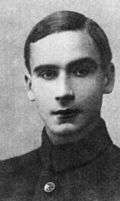Boris Kochno

Boris Evgenievich Kochno or Kokhno (Russian: Бори́с Евге́ньевич Кохно́; 3 January 1904 – 8 December 1990) was a Russian poet, dancer and librettist.
Kochno was born in Moscow, Russia, on 3 January 1904. His father served as a colonel in the hussars. He studied at the Imperial Lycee in Moscow before emigrating to Paris in 1920.[1]
He was close with Karol Szymanowski, who gave him as a gift a Russian translation of the chapter The Symposium from his unpublished novel Efebos.[2] Szymanowski also dedicated four poems to him. In 1920 he became Sergei Diaghilev's secretary, librettist, and eventually main collaborator. They were also briefly lovers. Kochno wrote the libretto of Stravinsky's Mavra (1921),[3] George Auric's Les Fâcheux (1924),[4] Henri Sauguet's La Chatte (1927),[5] and of Sergei Prokofiev's ballet score The Prodigal Son (1929).[6] In 1925, he had an affair with Cole Porter,[7] with whom he carried on a lengthy correspondence.
Upon Diaghilev's death, Kochno and Serge Lifar tried but failed to hold the Ballets Russes together. The two inherited part of Diaghilev's archives and collections, which Kochno completed and part of which was acquired by the Bibliothèque nationale de France. In 1933 he co-founded, together with George Balanchine, the short-lived but history-making company Les Ballets 1933,[8] which made its debut that summer at the Théâtre des Champs-Élysées. That same year, he and Edward James commissioned Brecht and Weill's last collaboration, The Seven Deadly Sins,[1] which Balanchine produced, directed, and choreographed.
At the end of World War II, Kochno entered into a partnership with Roland Petit, with whom he founded the Ballets des Champs-Élysées.[9]
His later career included a position as ballet director with the Ballet Russe de Monte Carlo, where he became an influential figure in post-World War II French ballet.
Kochno authored several works, including Diaghilev and the Ballets Russes, a record of the Diaghilev era, and Christian Bérard, a scrapbook of artwork by Bérard, Kochno's former lover and collaborator, along with reminiscences.
He died on 8 December 1990 in Paris following a fall.[1] He was buried in the Père Lachaise cemetery in Paris,[10] next to Wladimir Augenblick.
References
- 1 2 3 Kisselgoff, Anna (December 11, 1990). "Boris Kochno, 86, a Ballet Director and Scenarist". New York Times. Retrieved March 11, 2015.
- ↑ Stephen Downes, "Eros and Paneuropeanism", in Harry White and Michael Murphy, eds., Musical Constructions of Nationalism: Essays on the History and Ideology of European Musical Cultute, 1800-1945 (Cork University Press, 2001), 51-71, esp. 52, 66-7
- ↑ White, Eric Walter (1997). Stravinsky: A Critical Survey, 1882-1946. Dover Publications. p. 102.
- ↑ Garafola, Lynn; Van Norman Baer, Nancy, eds. (1999). The Ballets Russes and Its World. Yale University Press. p. 339.
- ↑ Garafola, Lynn; Van Norman Baer, Nancy, eds. (1999). The Ballets Russes and Its World. Yale University Press. p. 344.
- ↑ Kisselgoff, Anna (April 26, 1986). "'Prodigal Son' by City Ballet". New York Times. Retrieved March 11, 2015.
- ↑ Scheijen, Sjeng (2010). Diaghilev: A Life. Oxford University Press. p. 405.
- ↑ Kisselgoff, Anna (August 19, 1990). "Taking Fresh Stock of Les Ballets 1933". New York Times. Retrieved March 11, 2015.
- ↑ "Parisian Dancers Due Here in March". New York Times. February 18, 1947. Retrieved March 11, 2015.
- ↑ "Kochno Boris (1904-1990)". Association des Amis et Passionnés du Père-Lachaise. Retrieved March 11, 2015.
External links
| Wikisource has original text related to this article: |